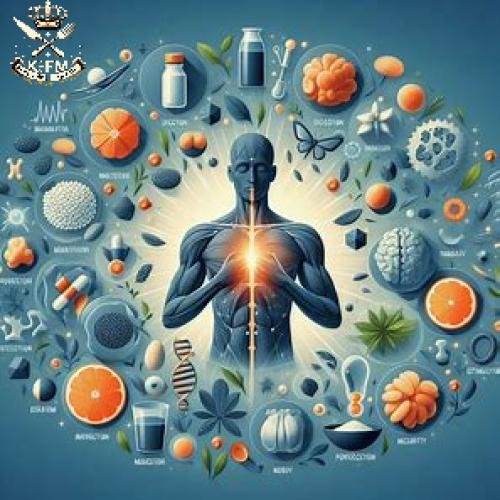Proteins and Body Health
It is well known that proteins are involved in building and renewing the body's cells, helping to maintain their integrity. Proteins are essential components of muscles, skin, hair, and nails. They also play an important role in the production of enzymes and hormones that regulate vital processes in the body. Without an adequate amount of protein, the body may suffer from a weakened immune system, delayed recovery from injuries, and low energy levels.
Types of Proteins
Animal Proteins:
- Sources: Meat, fish, poultry, eggs, and dairy products such as milk and cheese.
- Characteristics: Animal proteins are considered complete proteins because they contain all the essential amino acids that the body cannot produce on its own.
Plant Proteins:
- Sources: Legumes like beans and lentils, nuts, whole grains like quinoa and oats, and seeds such as chia seeds.
- Characteristics: Plant proteins are usually incomplete, meaning they may lack some essential amino acids. However, different plant protein sources can be combined to provide all the necessary amino acids. For example, combining beans with rice or chickpeas with tahini provides a complete amino acid profile.
Foods Rich in Proteins
- Meat: Chicken, beef, lamb.
- Fish: Tuna, salmon, mackerel.
- Legumes: Beans, lentils, chickpeas.
- Nuts: Almonds, cashews, walnuts.
- Dairy Products: Cheese, yogurt, milk.
- Seeds: Chia seeds, flaxseeds, pumpkin seeds.
Recommended Daily Amounts
- Adults: Adults need about 0.8 grams of protein per kilogram of body weight per day.
- Athletes or individuals with high physical activity: They may need around 1.2 to 2 grams of protein per kilogram of body weight.
- Pregnant and breastfeeding women: It’s important to increase protein intake during pregnancy and breastfeeding to support fetal growth and maternal health. Their requirement may be around 1.1 grams of protein per kilogram of body weight.

Proteins and Sleep: New Discoveries
In recent years, scientists have made new discoveries about the benefits of proteins that go beyond their traditional functions. Studies have shown that proteins may play an important role in addressing sleep issues such as insomnia. Insomnia is a sleep disorder that involves difficulty falling asleep or staying asleep, and it can significantly affect the quality of daily life.
A Scientific Study Confirming the Importance of Proteins in Treating Insomnia
One prominent scientist in this field is Dr. Richard Bottsin, head of the Research Department at the University of San Francisco. Dr. Bottsin and his team conducted a study on approximately 30 million people suffering from insomnia and nervous tensions. They found that consuming proteins could have a significant positive impact on sleep quality. Dr. Bottsin stated, "Consuming proteins such as milk and cheese helps combat insomnia and neurological disorders and contributes to improving sleep quality."
Dr. Bottsin pointed out that drinking a cup of milk before bedtime could be an effective alternative to sedative medications. Milk contains a high amount of protein, making it a complete and easily absorbable food. It also acts as a diuretic and does not leave toxic waste in the body. One liter of milk contains about 35 grams of protein, which helps improve both mental and physical well-being and reduces the severity of insomnia.
Additional Benefits of Milk as a Protein Source
In addition to its role in improving sleep quality, milk is also a rich source of vitamins and minerals such as calcium and vitamin D, which contribute to strengthening bones and teeth. Milk also contains a variety of essential amino acids that help build muscles and improve physical performance.

Tips for Maximizing the Benefits of Proteins
- Consume proteins regularly: To ensure you get the most benefit from proteins, it's important to include them in your daily diet. This can be achieved by eating protein-rich sources such as meats, fish, eggs, and dairy products.
- Drink milk before bed: Drinking a cup of milk before bedtime can be a natural alternative to sedative medications and helps improve sleep quality.
- Balanced nutrition: Make sure to consume a variety of foods containing proteins, along with fruits and vegetables, to maintain a well-balanced diet.
Importance of Proteins During Pregnancy and Breastfeeding
During pregnancy and breastfeeding, protein is essential to support the proper growth and development of the fetus, as well as to maintain the health of the mother. Proteins contribute to:
- Supporting Fetal Growth: Proteins help in the development of tissues and muscles in the fetus.
- Supporting Maternal Health: Protein helps maintain the mother's energy levels and improves the health of her tissues and muscles.
Frequently Asked Questions:
- What are the best sources of protein?
- Answer: The best sources of protein include meat, fish, eggs, dairy products, legumes, nuts, and other foods.
- Does plant protein equal animal protein?
- Answer: Yes, plant protein can equal animal protein if different sources of plant-based proteins are combined to provide all essential amino acids.
- Does protein help build muscles?
- Answer: Yes, protein is essential for muscle building and tissue repair after exercise.
- Does protein help with weight loss?
- Answer: Yes, protein enhances feelings of fullness and increases calorie burning, which aids in weight loss.
- Are there any harms from consuming too much protein?
- Answer: Excessive protein consumption can lead to kidney issues in some individuals and may contribute to weight gain if consumed with high-calorie foods.
Conclusion: Recent research shows that proteins, especially from sources like milk, offer benefits beyond just building cells and tissues. They play an effective role in improving sleep quality and addressing insomnia and nervous tensions. Therefore, it is essential to ensure proteins are included in our diet for better health and restful sleep.




















